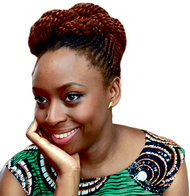 What’s the difference between an African-American and an American-African? From such a distinction springs a deep-seated discussion of race in Chimamanda Ngozi Adichie’s third novel, “Americanah.” Adichie, born in Nigeria but now living both in her homeland and in the United States, is an extraordinarily self-aware thinker and writer, possessing the ability to lambaste society without sneering or patronizing or polemicizing. For her, it seems no great feat to balance high-literary intentions with broad social critique. “Americanah” examines blackness in America, Nigeria and Britain, but it’s also a steady-handed dissection of the universal human experience — a platitude made fresh by the accuracy of Adichie’s observations.
What’s the difference between an African-American and an American-African? From such a distinction springs a deep-seated discussion of race in Chimamanda Ngozi Adichie’s third novel, “Americanah.” Adichie, born in Nigeria but now living both in her homeland and in the United States, is an extraordinarily self-aware thinker and writer, possessing the ability to lambaste society without sneering or patronizing or polemicizing. For her, it seems no great feat to balance high-literary intentions with broad social critique. “Americanah” examines blackness in America, Nigeria and Britain, but it’s also a steady-handed dissection of the universal human experience — a platitude made fresh by the accuracy of Adichie’s observations.
So an African-American is a black person with long generational lines in the United States, most likely with slave ancestors. She might write poetry about “Mother Africa,” but she’s pleased to be from a country that gives international aid rather than from one that receives it. An American-African is an African newly emigrated to the United States. In her native country, she didn’t realize she was black — she fit that description only after she landed in America. In college, the African-American joins the Black Student Union, while the American-African signs up with the African Students Association.
Adichie understands that such fine-grained differentiations don’t penetrate the minds of many Americans. This is why a lot of people here, when thinking of race and class, instinctively speak of “blacks and poor whites,” not “poor blacks and poor whites.” Many of Adichie’s best observations regard nuances of language. When people are reluctant to say “racist,” they say “racially charged.” The phrase “beautiful woman,” when enunciated in certain tones by certain haughty white women, undoubtedly means “ordinary-looking black woman.” Adichie’s characters aren’t, in fact, black. They’re “sable” or “gingerbread” or “caramel.” Sometimes their skin is so dark it has “an undertone of blueberries.”
Plot
As teenagers in a Lagos secondary school, Ifemelu and Obinze fell in love. Their Nigeria is under military dictatorship, and people are leaving the country if they can. Ifemelu departs for the United States to study. Through her experiences in relationships and studies, she struggles with the experience of racism in American culture, and the many varieties of racial distinctions. Obinze, son of a professor, had hoped to join her in the US but he is refused a visa after 9/11. He goes to London, entering illegally, and enters an undocumented life.
Years later, Obinze has returned to Nigeria and become a wealthy man as a property developer in the newly democratic country. Ifemelu gained success staying in the United States, where she became known for her blog about race in America, entitled “Raceteenth or Various Observations About American Blacks (Those Formerly Known as Negroes) by a Non-American Black”. When Ifemelu returns to Nigeria, the two have to make tough decisions after reviving their relationship.
Reception
The book was well-received by critics, who especially noted its range across different societies and reflection of global tensions. The New York Times said, “‘Americanah’ examines blackness in America, Nigeria and Britain, but it’s also a steady-handed dissection of the universal human experience — a platitude made fresh by the accuracy of Adichie’s observations.”] The reviewer concludes, “Americanah” is witheringly trenchant and hugely empathetic, both worldly and geographically precise, a novel that holds the discomfiting realities of our times fearlessly before us. It never feels false.”
Awards:
- Selected as one of the 10 Best Books of 2013 by the editors of the New York Times Book Review.
- 2013 National Book Critics Circle Award(Fiction).
- Shortlisted for the 2014 Baileys Women’s Prize for Fiction of the United Kingdom.
Book Group discussion meeting February 11th, 12:30 p.m. at the Darien Library Discussion Leader: Sunil Saksena
